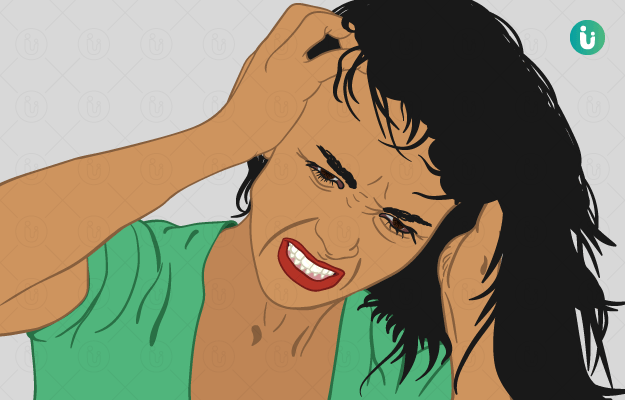What is itchy scalp?
Itchy scalp is a common complaint. It is common often without any evidence of the cause of the itching, making it a distressing situation both for the clinician and the patient. It is classified into two types depending on the presence or absence of hair loss and with or without visible lesions.
What are its main associated signs and symptoms?
Itchy scalp is itself a symptom. It may be accompanied by other signs and symptoms such as:
- Inflamed scalp
- Dandruff
- Presence of nits from lice
- Patches of redness
- Scaling
- Pus or crusting
What are the main causes?
Itchy scalp is a symptom which can be caused by any of the following conditions:
- Dermatologic, which arise from the skin like a fungal infection of the scalp, psoriasis, eczema and others
- Head lice
- Neuropathic, which can arise from the disorders of afferent nerve fibres
- Systemic diseases, which affect the entire body like lupus
- Psychogenic/psychosomatic, which is related to psychiatric and psychosomatic (physical illness that are caused or aggravated by psychiatric factor) diseases
How is it diagnosed and treated?
The acronym SCALLP is useful in the diagnosis of the underlying condition causing itchy scalp. It takes five steps for complete evaluation of the scalp. These steps are:
- Listen: Listening carefully to the patient history
- Look: Complete physical evaluation of the affected regions
- Touch: Touching the scalp to feel its texture
- Magnify: Observing the scalp under the microscope
- Sample collection: In some cases, a tissue sample can be collected for examination under a microscope to confirm the diagnosis
Treatment of itchy scalp includes:
- When it is due to chronic folliculitis or dry skin or acne, medications such as tetracycline (doxycycline, minocycline), PAR-2 antibodies or antagonists are used.
- When it is due to psoriasis, or seborrheic dermatitis, then anti-histamines are used.
- Antifungal medications will be recommended to treat ringworm of scalp.
- Local steroids might be advised for eczema and psoriasis of the scalp.
- In neuropathic itch, topical cannabinoid receptor agonists are used for treatment.
- Head lice need topical permethrin containing shampoos or solutions that kill lice and their eggs. This would typically have a regimen of a few days to be followed.

 Doctors for Itchy Scalp
Doctors for Itchy Scalp  OTC Medicines for Itchy Scalp
OTC Medicines for Itchy Scalp
 Itchy Scalp articles
Itchy Scalp articles

 Homeopathic Treatment of Itchy Scalp
Homeopathic Treatment of Itchy Scalp






 Editorial Team
Editorial Team











